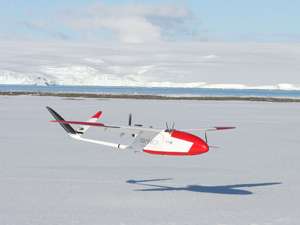Researchers unite to address the problems that drones and other unmanned vehicles encounter in a harsh Arctic climate

Drones and other remote-controlled and autonomous vehicles face a series of challenges when deployed in harsh and cold environment. Cool humid air ices down wings, propellers and crucial sensors on aircraft, and low temperatures drain batteries. Satellite and mobile phone coverage is often inadequate in high and scarcely populated latitudes, making communication and data transfer difficult and/or highly expensive, and the magnetic pole is constantly moving, making several instruments less reliable in the polar region. Further, sea ice makes communication with underwater gliders and other underwater vehicles even more difficult and poses a hazard to surface vehicles.
During a Svalbard Strategic Grant-funded workshop in Tromsø on 5-6 April, users and developers of different unmanned robots, such as remotely operated underwater vehicles (ROVs), autonomous underwater vehicles (AUVs), unmanned aerial vehicles (UAVs), and unmanned surface vehicles (USVs), met to exchange their experiences, frustrations and possible fixes with each other. Researchers found that they were facing many of the same climate-induced challenges and were working on parallel solutions.
"It seems like everyone is trying to invent the same wheel," Professor Cathy Cahill at the University of Alaska Fairbanks noted.
The two-day workshop, labelled The Remote Controlled and Autonomous Measurement Platforms Flagship (ReCAMP) by the organizing consortium led by Norut Northern Research Institute, united researchers from several countries and from different research communities in Svalbard.
Project manager Dr. Rune Storvold at Norut acknowledged a need for further collaboration, coordination and data sharing among the partners, and informed that a second ReCAMP workshop would be held in 2017, possibly in Trondheim. The research network is open to new partners, Dr. Storvold stressed. He added that funds are now available to facilitate the exchange of Arctic-related experiences and technologies, through so-called Short Term Scientific Missions.
More information: For more information, see www.asuf.no/recamp/
Provided by The Research Council of Norway




















